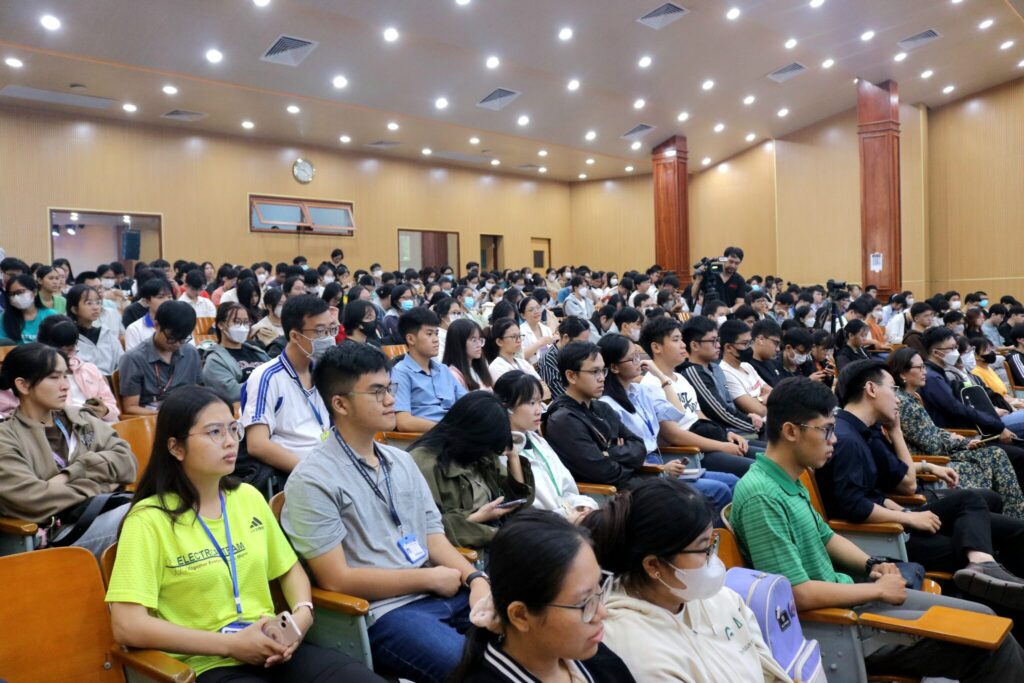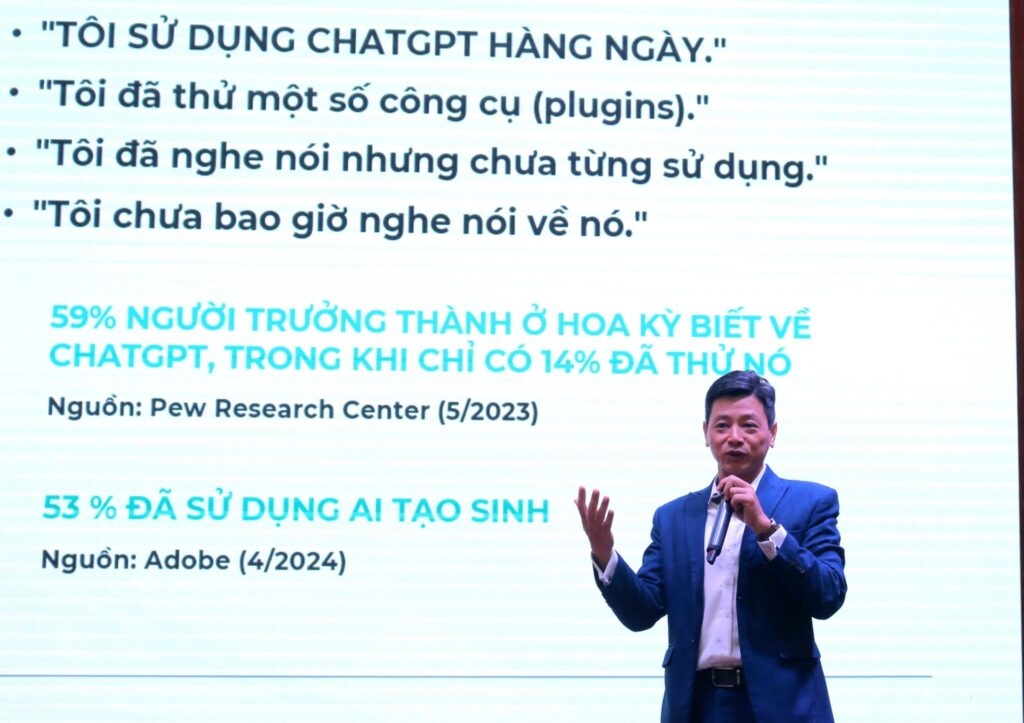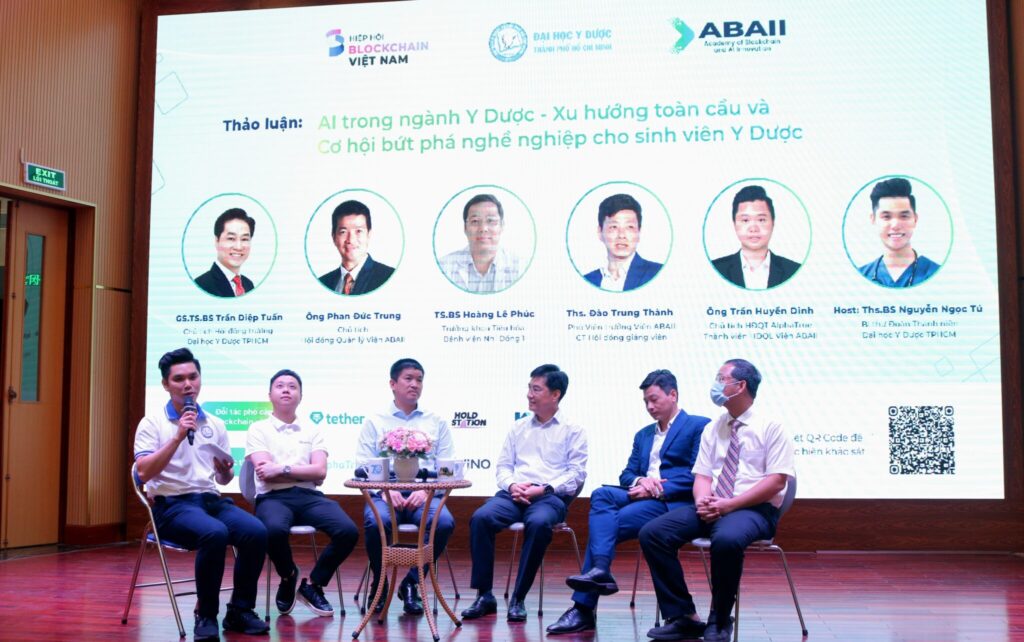Quick survey data at the auditorium shows the level of interest and readiness to embrace new technologies like Artificial Intelligence (AI) among students at the University of Medicine and Pharmacy in Ho Chi Minh City in particular. However, the application of AI in healthcare also raises high responsibilities regarding the protection of patient privacy and ensuring fairness in healthcare access.
On August 24, 2024, the seminar ‘AI Applications in the Medical and Pharmaceutical Industry: Global Trends and Practices in Vietnam’ was organized by the Academy of Blockchain and AI Innovation (ABAII), the Vietnam Blockchain Association (VBA), in collaboration with the University of Medicine and Pharmacy in Ho Chi Minh City, for nearly 500 students, lecturers, and staff of the university. The program was attended by representatives from the Ho Chi Minh City Department of Health and the Ho Chi Minh City Department of Information and Communications.

According to Prof. Dr. Trần Diệp Tuấn, Chairman of the University Council at the University of Medicine and Pharmacy in Ho Chi Minh City, “In Vietnam, AI is opening up many new opportunities for the healthcare sector and is being practically applied in many hospitals and treatment facilities. The University of Medicine and Pharmacy in Ho Chi Minh City is proactively leveraging these opportunities by promoting research, training, and integrating AI into practical medical activities. The university also plans to revise its curriculum, providing additional tools for lecturers and students to keep up with the rapid advancements and changes in global technology.” However, Mr. Tuấn also emphasized that AI has its limitations and weaknesses that need attention, placing a responsibility on users to protect patient privacy and ensure fairness in healthcare access.
Expressing his support for efforts to promote AI applications in the medical and pharmaceutical industry, Mr. Phan Đức Trung, Executive Vice President of the Vietnam Blockchain Association (VBA) and Chairman of the ABAII Institute’s Board of Directors stated that they will support the University of Medicine and Pharmacy in Ho Chi Minh City in specific activities such as using AI to enrich exam content and providing a training and teaching platform for the university through ABAII Institute’s MasterTeck online learning system.
In addition, the VBA and ABAII Institute can also support the university in managing and issuing diplomas on the blockchain network, ensuring transparency, while providing training courses for staff and lecturers on how to use AI applications effectively, creating more opportunities for research and AI applications in healthcare.
Regarding the overall impact of AI on the medical sector, Mr. Đào Trung Thành, Deputy Director of the ABAII Institute, shared that, according to research from the Harvard T.H. Chan School of Public Health, the adoption of AI could reduce treatment costs by up to 50% and improve health outcomes by 40%, thanks to its ability to process and analyze massive amounts of data to enhance diagnostic and treatment efficiency. According to Mr. Thành, the most significant achievements of AI in the healthcare industry currently include disease diagnosis, drug development, medical record management, surgical robots, and 24/7 virtual medical assistants.

Specifically, AI is currently capable of analyzing medical images such as X-rays, MRIs, and CT scans to detect potential pathological signs with high accuracy and speed (notable applications include Zebra Medical Vision, Qure.ai, Paige AI, etc.). This technology also optimizes the drug development process by identifying targets and developing new drugs, simulating biological processes, and calculating predicted effects using tools like BenevolentAI, Insilico Medicine, Atomwise, and others. Notably, AI can enhance surgical efficiency with AI-assisted robots in complex surgeries, minimizing invasiveness or performing procedures through a single port (such as Intuitive Surgical, Versius Robotics, Transenterix, etc.).
Dr. Hoàng Lê Phúc, Head of the Gastroenterology Department at Children’s Hospital 1, also shared detailed guidance with students on how to apply and optimize the effectiveness of ChatGPT in research, study, and patient care, such as assisting patients in scheduling doctor appointments, summarizing medical records, translating medical literature, and compiling resources.
Additionally, Mr. Lê Hoàng Hướng from FPT Technology Group provided notable insights at the seminar on AI advancements in medical diagnosis, stating that AI has achieved an accuracy rate of up to 96.51% in breast cancer classification, 99.70% in skin cancer diagnosis, and 97% with an F1 score of 98% for monkeypox diagnosis.
To further clarify the advanced applications of AI in the medical field, as well as ethical issues and career opportunities for medical and pharmacy students, the experts engaged in a lively and open discussion. The session included dozens of questions from the students themselves, focusing on practical applications and important considerations when applying AI in healthcare.

According to a quick survey conducted by Prof. Dr. Trần Diệp Tuấn at the auditorium, about 70% of students at the University of Medicine and Pharmacy in Ho Chi Minh City are aware of and using some popular AI applications in their daily activities. This is an encouraging figure, indicating the students’ level of interest and readiness to embrace new technology.
In his role as Vice Director of the ABAII Institute, Mr. Đào Trung Thành recommended that large organizations, as well as individuals, should take AI ethics and reliable AI models seriously. ‘Reliable AI is a comprehensive definition that encompasses legal, ethical, and sustainable AI.’ He emphasized that ‘ethical AI must meet four principles: Respect for autonomy, prevention of harm, fairness, and transparency.’
